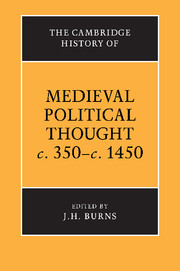Book contents
- Frontmatter
- Introduction
- I Foundations
- II Byzantium
- III Beginnings: c. 350–c. 750
- IV Formation: c. 750–c. 1150
- 8 Introduction: the formation of political thought in the west
- 9 Government, law and society
- 10 Kingship and empire
- 11 Church and papacy
- 12 The twelfth-century renaissance
- V Development: c. 1150–c. 1450
- Conclusion
- Biographies
- Bibliography
- Index of names of persons
- Index of subjects
- References
9 - Government, law and society
from IV - Formation: c. 750–c. 1150
Published online by Cambridge University Press: 28 March 2008
- Frontmatter
- Introduction
- I Foundations
- II Byzantium
- III Beginnings: c. 350–c. 750
- IV Formation: c. 750–c. 1150
- 8 Introduction: the formation of political thought in the west
- 9 Government, law and society
- 10 Kingship and empire
- 11 Church and papacy
- 12 The twelfth-century renaissance
- V Development: c. 1150–c. 1450
- Conclusion
- Biographies
- Bibliography
- Index of names of persons
- Index of subjects
- References
Summary
The student of political action and thought from the Carolingian age to the ‘renaissance of the twelfth century’ will naturally concentrate on the development of monarchy and of feudalism. It is, after all, in this period that the ‘feudal monarchy’ – to use a phrase given wide circulation by Petit-Dutaillis’ classic work – is said to have flourished. The first part of this chapter will therefore seek to unravel the main lines of development in the monarchy built by the Carolingians in the eighth and ninth centuries. This underwent an eclipse verging on total collapse during the tenth and eleventh centuries, and was followed in the twelfth by a number of successors, the direct ancestors of the national states of modern Europe. The second and third parts of what follows will deal with manorialism and feudalism respectively, with the aim of establishing their role and importance in this period.
Monarchical government
The Carolingian Empire and its disintegration
The starting point of the analysis is the historic fact that the Carolingians founded a great multiracial state which comprised all western Christendom except the British Isles and gave its mainly Romanic and Germanic peoples a period of political stability and peace such as they had not known since before the days of the Germanic invasions. This pax Francorum was the result of an original mixture of Germanic and Mediterranean elements, strongly influenced by Christian ideas and based on the prestige of the house of Charlemagne.
- Type
- Chapter
- Information
- The Cambridge History of Medieval Political Thought c.350–c.1450 , pp. 174 - 210Publisher: Cambridge University PressPrint publication year: 1988
References
- 6
- Cited by

